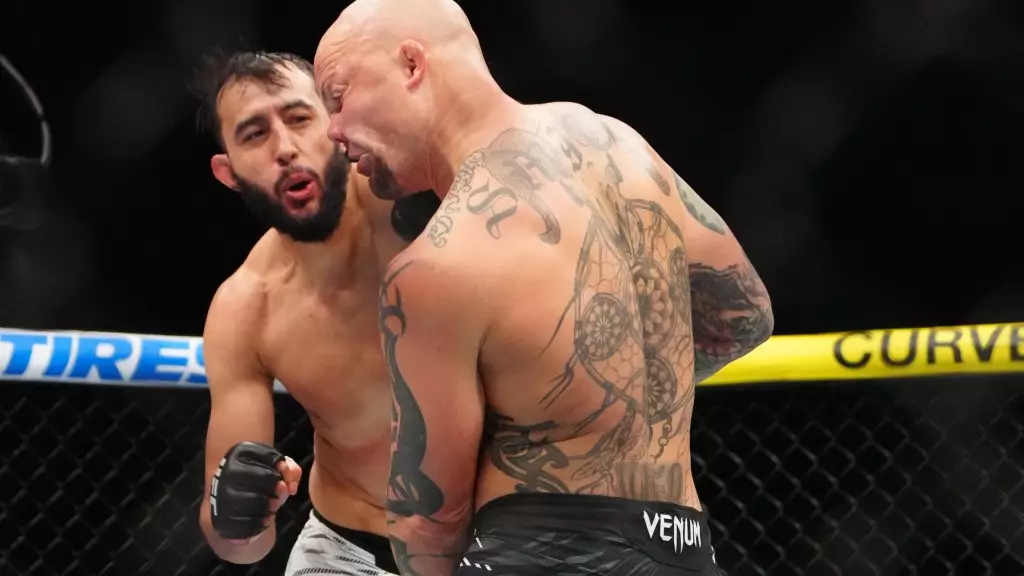The highly anticipated showdown between Dominick Reyes and Anthony Smith at UFC 310 showcased not only the physicality of mixed martial arts but also the profound emotional struggles that athletes often experience outside the octagon. Reyes (14-4 MMA, 8-4 UFC) emerged victorious from the bout held at the T-Mobile Arena, winning via second-round TKO, adding another chapter to both fighters’ careers. However, this match was particularly poignant, as it coincided with a time of grief for Smith (38-21 MMA, 13-11 UFC), who faced the fight following the recent and tragic loss of his close friend and mentor, Scott Morton.
From the outset, it was clear that Smith was fighting not only against Reyes but also against the heavy burden of sorrow weighing on his heart. His emotional state was palpable; tears streamed down his face during his walkout, hinting at the internal battle he was undertaking. Moreover, his determination to engage in the fight, despite the overwhelming grief, painted a vivid picture of a warrior willing to push through physical pain as a means to confront emotional trauma.
Reyes spoke candidly about his feelings toward Smith during the match, acknowledging the psychological resilience required to compete under such conditions. He articulated the essence of Smith’s warrior spirit, describing how the latter appeared to embrace his suffering, even inviting Reyes to inflict damage. “Punch me in the face,” Smith seemingly urged, indicating a desire to connect with the pain in a way that could serve as an emotional release. This moment exemplified how combat sports can sometimes provide catharsis, allowing athletes to channel their emotional and psychological struggles into a physical outlet.
The dynamic between the two fighters transformed the match into a layered confrontation, revealing complexities rarely seen in the UFC ring. Reyes’s acknowledgment of Smith’s grief added a human element to the encounter, turning it into more than just a contest of skill; it became an exploration of raw emotion and vulnerability. Reyes, empathizing with Smith’s loss, affirmed that while fighters are trained to focus on victory, they are also deeply understanding of what their opponents might be experiencing beyond the fight.
For Reyes, the victory marked a much-needed morale boost, especially as this win represented the first winning streak since 2019 amidst his battle with personal losses. His reflections on their shared struggles underscored the reality that athletes are not solely defined by their performances; they are human beings navigating the intricacies of life just like anyone else. “Losing someone is never easy,” Reyes remarked, drawing parallels between his own challenges and those faced by Smith. Such sentiments resonate deeply, revealing how the fight game is a microcosm of life’s larger challenges.
As the referee eventually stepped in to halt the match, it was a testament to the dangers embedded in embracing such intense emotional states while competing at professional levels. The calls to have the match stopped serve as reminders that while the arena is a place for warriors, it is still fraught with danger—both physical and emotional. Reyes’s victory didn’t just signify a step forward in his career; it carved out a unique space for dialogue about mental health and the importance of acknowledging personal losses while pursuing professional goals.
The fight between Reyes and Smith at UFC 310 serves as a striking reminder that sports, especially contact sports like MMA, often transcend the physical exchange of blows. In this case, the ring became symbolic of a battlefield against grief, emotional turmoil, and the resilience required to overcome personal tragedies. As athletes like Smith and Reyes wrestle not just with opponents but also their inner demons, the world of combat sports becomes an arena of not only athletic rivalry but of emotional expression and healing. It invites spectators to appreciate the deeper narratives hidden behind the physical contests, illuminating the reality that in many ways, these fighters are as much athletes as they are human beings trying to navigate their tumultuous lives.

